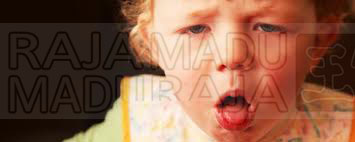Honey Child
 |
| Honey Child |
Relieve Children's Cough with Honey
The results of research by researchers from Pennsylvania State University in Hershey, United States: Honey proven to effectively relieve coughing in children and help them sleep soundly at night. Treatment with honey is even better than cough syrup containing dextromethorphan.
"The results were so convincing that we can state clearly that honey is better than dextromethorphan or no treatment at all," said Dr. Ian M. Paul one of the researchers, told Reuters Health, Tuesday (4/12).
Federal Medical Advisory recently warned that OTC cough or cold medicines should not be used for children under six years of age. The manufacturer should also attract a number of products for babies off the market.
So far, the treatment for cough due to respiratory infection or common cold there are no truly effective. While dextromethorphan is widely used, but there is no evidence that these drugs actually work.
Some pediatricians who read the results of this study recommend that honey child can be an alternative to overcome cough in children. However, they suggest, honey should not be given to children under one year.
In their study, the researchers enrolled 105 children with upper respiratory infections at a clinic in Pennsylvania. The parents of this child was given each of them a bag containing drugs and their dosage instructions. Some bags do not include medication. Some of the bags containing the drug dextromethorphan with aromas of honey, while the other contains a similar dose of honey.
The researchers collected data on symptoms of cough and sleeping children from their parents, both before and after treatment. All children progress, but who eat honey consistently recorded the highest average scores in decreasing the frequency and severity of their cough. Children who drank honey also experienced an improvement in their sleep quality.
Sources:
Effect of honey, dextromethorphan, and No Treatment on Nocturnal Cough and Sleep Quality for Children and Their Parents coughing "
Ian M. Paul, MD, MSc; Jessica Beiler, MPH; Amyee McMonagle, RN; Michele L. Shaffer, PhD; Laura Duda, MD; Cheston M. Berlin Jr., MD
Arch Pediatr Adolesc Med. , 2007; 161 (12) :1140-1146.